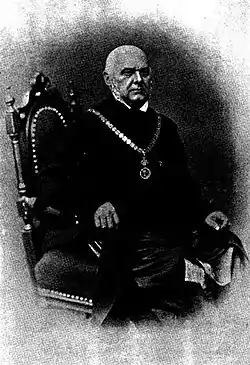Yakub Holovatsky
Yakub, Yakov, Yakiv Holovatsky, also Yakov Golovatsky (Ukrainian: Яків Федорович Головацький, Russian: Яков Фёдорович Головацкий; October 17, 1814 in Chepeli, Zolochiv county, Kingdom of Galicia and Lodomeria, Austrian Empire — May 13, 1888 in Vilno, Russian Empire) was a noted Galician historian, literary scholar, ethnographer, linguist, bibliographer, lexicographer, poet and leader of Galician Russophiles. He was a member of the Ruthenian Triad, one of the most influential Ukrainian literary groups in the Austrian Empire.[1][2][3][4][5]
Yakub Holovatsky | |
|---|---|
 | |
| Born | October 17, 1814 Chepeli, Kingdom of Galicia and Lodomeria, Austrian Empire |
| Died | May 13, 1888 (aged 73) Vilna, Vilna Governorate, Russian Empire |
| Pen name | Havrylo Rusyn |
| Occupation | historian, literary scholar, ethnographer, linguist, bibliographer, lexicographer, poet, priest, and pedagogue |
| Citizenship | Austria-Hungary |
| Education | Theological Seminary (Lviv) |
| Alma mater | University of Lviv (1841) |
| Literary movement | Ruthenian Triad, later Pan-Slavism |
| Notable works | The Dniester Nymph, 1836 |
Biography
Yakov was born in a family of a priest Fedir Ivanovych Holovatsky (Hlavatsky) whose heritage takes roots in the city of Mykolaiv (today in Lviv Oblast). Ivan Holovatsky, grandfather of Yakov, was szlachtycz of Polish Prus coat of arms family and the burg-minister of Mykolaiv. Yakiv's mother Fekla Vasylivna Yakymovich also was from the family of a priest in Tur, Zloczow powiat. His education he received in Lviv where later he enrolled into the Theological Seminary of the University of Lviv. As a student he traversed Galicia, Bukovyna, and Transcarpathia collecting folk songs. In 1832, at Lviv University he, Markiyan Shashkevych, and Ivan Vahylevych formed the Ruthenian Triad, which published the first Halycz almanac in the vernacular, Rusalka Dnistrovaya (The Dniester Nymph, 1836), and played an important role in the Galician cultural revival. In 1842 he became a Greek-Catholic priest and later received an appointment to the village of Mykytyntsi near Kolomea. From 1848 to 1867 he was the first professor of Ukrainian philology at Lviv University. During that time in 1864-1866 was the rector (rector magnificus) of the university. Influenced by Mikhail Pogodin's Pan-Slavist ideas, he became a Russophile in the 1850s. Dismissed from the university for his views, in 1867 he moved to Russian-ruled Vilno to head the archeological commission there.
References
- Ronald Grigor Suny, Michael D. Kennedy (Ed.): Intellectuals and the Articulation of the Nation. University of Michigan Press, P. 127.
- Orest Subtelny: Ukraine: A History. Toronto 2000, P. 317.
- Kohn, Hans: Pan-Slavism: its history and ideology. University of Notre Dame Press, 1953. P. 62
- Kohn, Hans: Die Slawen und der Westen: die Geschichte des Panslawismus. Verlag Herold, 1956 S. 70.
- Яків Федорович ГОЛОВАЦЬКИЙ